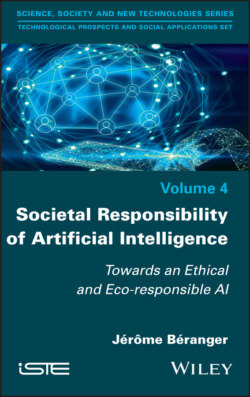Читать книгу Societal Responsibility of Artificial Intelligence - Группа авторов - Страница 17
ETHICS BY EVOLUTION.–
ОглавлениеIt is an approach that incorporates recommendations and ethical rules, in an evolutionary manner over time, throughout the lifecycle of NICTs, i.e. until its implementation and evolutionary use.
This book is intended to categorize ethical issues related to the digital environment, both from the point of view of the user and the designer of digital solutions and/or services. It invites reflection (what questions businesses can ask themselves about digital ethics) and suggests avenues for action. It is an approach that aims to provide guidelines to bring out the values that we want to collectively put forward to help legislators to formulate laws that will build a framework for AI. This repository is not exhaustive. It is intended to be general, open to all contributions and evolving. It must be regularly updated to ensure its consistency and constant relevance as the digital environment and our technological knowledge evolves. It is intended as a reminder of the company’s regulatory duties, which precisely define what is permitted or prohibited, and the sanctions that apply. The company has an obligation to comply, and this does not concern the area of ethics. However, the means by which it complies can be the subject of ethical reflection.
Finally, this book is addressed to all stakeholders involved in the development, deployment or use of AI, including organizations, companies, public services, researchers, individuals or other entities. This document should, therefore, be considered as the first building block of a discussion between these different actors toward an ethical, responsible, trustworthy AI aimed at protecting and serving in a beneficial way individuals and the common good for a better adoption at the global level.
1 1 In France, crowdsourcing is defined according to the Commission générale de terminologie et de néologie (2014) as the “mode of completion of a project or a product calling for contributions from a large number of people, generally Internet users”. JORF, 0179(91), 12995.
2 2 ISO 2382-28:1995 defines artificial intelligence as “the capability of a functional unit to perform functions that are generally associated with human intelligence, such as reasoning and learning”.
3 3 IEEE P7000: Model Process for Addressing Ethical Concerns During System Design; IEEE P7001: Transparency of Autonomous Systems; IEEE P7002: Data Privacy Process; IEEE P7003: Algorithmic Bias Considerations; IETF Research into Human Rights Protocol Considerations draft.
4 4 CNIL (2017). Comment permettre à l’homme de garder la main ? Les enjeux éthiques des algorithmes et de l’intelligence artificielle. Summary report of the public debate led by the CNIL in the context of the mission of ethical reflection entrusted by law for a digital Republic.
5 5 These seven essential requirements include human factor and human control, technical robustness and security, privacy and data governance, transparency, diversity, non-discrimination and equity, societal and environmental well-being, and accountability.
6 6 On May 22, 2019, through the OECD Council of Ministers, 42 countries (the 36 OECD countries and Argentina, Brazil, Colombia, Costa Rica, Peru, and Romania) adopted the principles set out in the OECD Recommendation on AI, making it the first intergovernmental agreement to stimulate innovation and build confidence in AI by promoting a responsible approach to trusted AI, while ensuring respect for human rights and democratic values.
7 7 This consists of integrating ethical rules and requirements from the design and learning of these NICTs, prohibiting direct or indirect damage to the fundamental values protected by the conventions.
